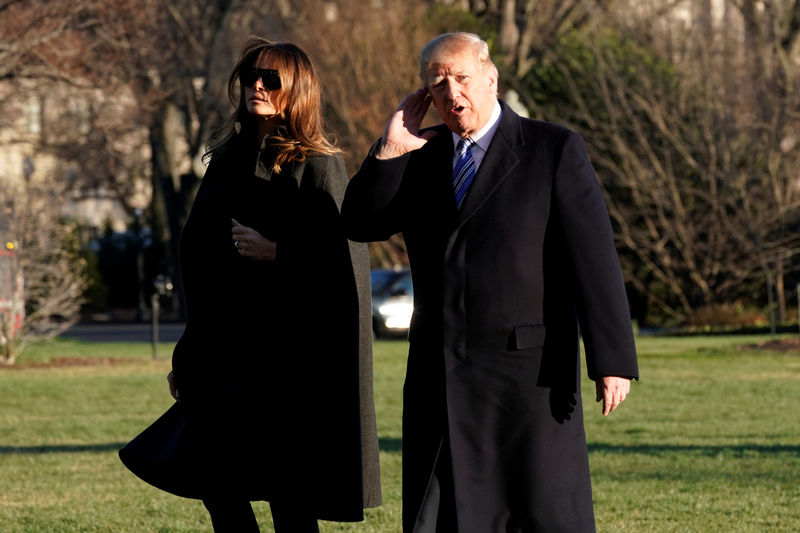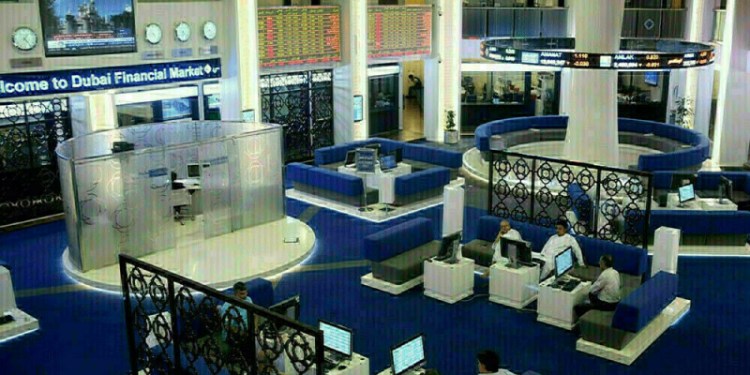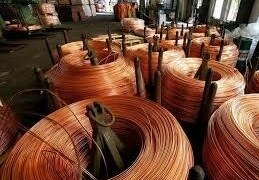 © Reuters. U.S. President Donald Trump listens to reporters as walks with first lady Melania Trump on South Lawn of the White House upon their return to Washington, U.S., from Palm Beach
© Reuters. U.S. President Donald Trump listens to reporters as walks with first lady Melania Trump on South Lawn of the White House upon their return to Washington, U.S., from Palm BeachBy Valerie Volcovici and Doina Chiacu
WASHINGTON (Reuters) – A top trade adviser to U.S. President Donald Trump said on Sunday a process will be in place for businesses to get exemptions from the White House plan to place steep tariffs on steel and aluminum, offering the first indication a tariff hike could be less broad than first thought.
Peter Navarro, director of the White House National Trade Council, said countries will not be excluded from the tariffs because that would become a slippery slope, but there will be a mechanism for corporate exemptions in some cases.
“There will be an exemption procedure for particular cases where we need to have exemptions, so that business can move forward,” Navarro said on CNN’s “State of the Union” program.
The scenario of possible exceptions came after Trump’s surprise announcement on Thursday and subsequent aggressive business lobbying against the tariffs, an outcry from U.S. trading partners and criticism from fellow Republicans.
Trump has spoken to world leaders about the planned tariff hikes but has given no indication he would allow exemptions, Commerce Secretary Wilbur Ross said on Sunday.
Navarro did not elaborate on the exemption procedure and the White House did not immediately return a request for comment.
Navarro and Ross, who have advocated stronger trade policies to reduce U.S. trade imbalances, went on Sunday U.S. television news shows in hopes of containing the global fallout from Trump’s announcement.
The president said the United States would impose duties of 25 percent on imported steel and 10 percent on aluminum to protect domestic producers. The plan stunned U.S. trading partners, alarmed American industry leaders and roiled stock markets.
Energy industry officials raised concerns about the tariffs on steel since the sector relies on imports for everything from pipelines to drilling equipment to liquefied import terminals.
“The U.S. oil and natural gas industry, in particular, relies on specialty steel for many of its projects that most U.S. steelmakers don’t supply,” American Petroleum Institute President Jack Gerard said last week.
The steel used to make large-diameter, thick-walled pipe for interstate natural gas and oil pipeline projects are not available off the shelf or from a wide variety of manufacturers, according to the Interstate Natural Gas Association of America.
‘DEEP CONCERN’
Numerous world leaders and ministers have been in touch with Trump and administration officials including Ross, suggesting an intensive behind-the-scenes effort to change the president’s mind, the commerce secretary said.
British Prime Minister Theresa May told Trump she had “deep concern” about the expected tariffs, May’s office said on Sunday following a phone call between the two leaders.
May noted that “multilateral action was the only way to resolve the problem of global overcapacity in all parties’ interests,” a spokeswoman said.
Ross said there was no indication yet that Trump would consider exemptions for countries, but he did not rule it out.
“We’ll see. The president makes the decision,” Ross said on NBC’s “Meet the Press” program.
Canada, the biggest steel supplier to the United States, is trying to secure an exemption from potential U.S. tariffs on steel and has threatened retaliation if the plan goes ahead.
Ross played down the effects of the proposed tariffs on the U.S. economy. saying they represent a fraction of 1 percent of the economy. “So the notion that it would destroy a lot of jobs, raise prices, disrupt things, is wrong,” Ross told ABC’s “This Week” program.
The commerce secretary dismissed European Union threats of retaliatory tariffs on flagship American products, including Harley Davidson motorcycles, bourbon and Levi’s jeans, which he said amounted to about $3 billion. He called them “pretty trivial” and a “rounding error.”
On Saturday, Trump threatened European automakers with a tax on imports if the European Union retaliates.
A number of Trump’s fellow Republicans, including congressional leaders, urged him to hold back on the tariffs.
Josh Bolten, chief executive officer of the influential Business Roundtable and former chief of staff to President George W. Bush, described the tariffs as “a huge mistake” on the “Fox News Sunday” program.
“This will cause huge damage across broad sectors of the economy,” he said.
Bolten said Trump’s proposed tariffs would not affect China, which accounts for only 2 percent of U.S. steel imports.
“You are letting China off the hook. China wins when we are fighting with Europe,” Republican Senator Lindsey Graham said on Fox.
Source: Investing.com























